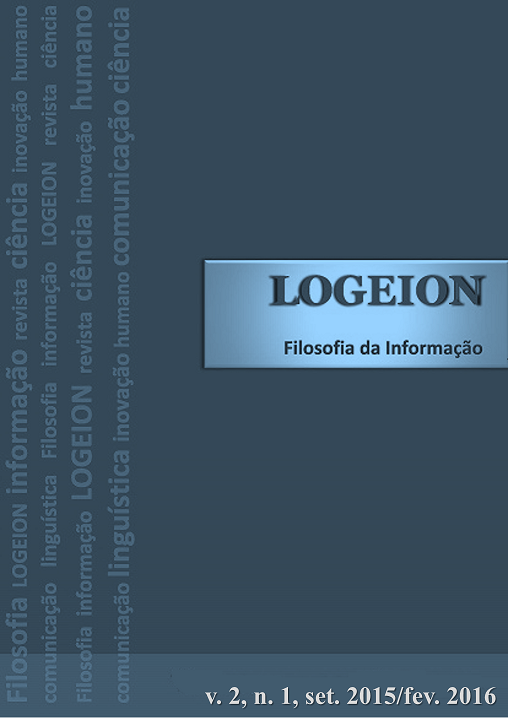HUMANISTIC INFORMATION STUDIES: A PROPOSAL. PART 2: NORMATIVE PROFESSIONALIZATION
DOI:
https://doi.org/10.21728/logeion.2016v2n1.p11-32Keywords:
humanistic information studies, normative professionalization, organizational theoryAbstract
Beginning from a preliminary explanation in Part 1 (Logeion, v.1, n.2) about the transitional zone between system and world of life, this paper discusses the enrichment of the production of informational knowledge, focusing on the crucial role of normative professionalization and organizational cultures in Humanistic Information Studies. The concept of normative professionalization, initially constructed from Habermas analysis of ‘system’ and ‘world of life’, and Foucault’s analysis of ‘truth’ and power in the social sciences, was enriched by the dialog with Freidson about "good works", Ricoeur's ethical perspective, the ethics of craftsmanship developed by Sennett, and Schön's analysis of professional reflexivity. Today it is possible to view the initially referred to transitional zone as a dynamic place where contemporary organizational theory and normative professionalization may open perspectives to wider moral values. Great conceptual efforts are needed. But the greatest challenge lies in the normative aspects which require new forms of cooperation based on radical equality between academic researchers and professionals working in organizations to connect the different forms of knowledge on the basis of equality, and characteristics established on the practice-based character of normative professionalization.
ESTUDOS HUMANÍSTICOS DA INFORMAÇAO: UMA PROPOSTA.
PARTE 2: A PROFISSIONALIZAÇÃO NORMATIVA
Resumo
Partindo do entendimento de uma zona de transição entre sistema e mundo da vida, apresentado na Parte 1 (Logeion, v.1, n.2), este texto discute o enriquecimento da produção de conhecimento informacional, enfocando o papel crucial da profissionalização normativa e das culturas organizacionais nos Estudos Humanísticos da Informação. O conceito de profissionalização normativa, inicialmente construído a partir da análise de 'sistema' e 'mundo da vida' de Habermas e da análise de Foucault sobre a relação entre verdade e poder nas ciências sociais, foi enriquecido pelo diálogo com Freidson sobre o "bom trabalho", a perspectiva ética de Ricoeur, a ética do artesanato desenvolvida por Sennett, e a análise da reflexividade profissional de Schön. Hoje podemos ver referida zona de transição inicial como um lugar dinâmico, onde a teoria organizacional contemporânea e a profissionalização normativa podem abrir a perspectiva de valores morais mais amplos. São ainda necessários grandes esforços conceituais. O maior desafio reside no lado normativo, que pede novas formas de cooperação com base na igualdade radical entre pesquisadores acadêmicos e profissionais que trabalham em organizações, para conectar as diferentes formas de conhecimento sobre uma base da igualdade e nas características, situadas e baseadas na prática, da profissionalização normativa.
Downloads
Downloads
Published
Issue
Section
License
Copyright (c) 2023 Logeion: Filosofia da Informação

This work is licensed under a Creative Commons Attribution-NonCommercial-ShareAlike 4.0 International License.
The journal is published under the Creative Commons - Attribution - Noncommercial - Share Alike 3.0 Brazil.
The published work is considered collaboration and therefore the author will not receive any remuneration for this as well as anything will be charged in exchange for publication.
All texts are responsibility of the authors.
It’s allowed partial or total reproduction of the texts of the magazine since the source is cited.














